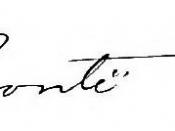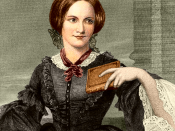In a period when women were supposed to do nothing more than cook, clean and take care of their house, Charlotte Bronte allowed her mind to wander to places off limits to women. While fulfilling her duties of teaching and sewing, she longed to be reading and writing which is something that women in her time just did not do. In response to her letter requesting an opinion about some of her writing, Robert Southey found it necessary to inform the obviously confused Ms. Bronte of the role of women. The content and tone of his letter was disdainful and lofty while Ms. Bronte?s response was just as condescending. Her reply of sheer acceptance and agreement was another scream of disdain obvious through her cunning use of sarcasm. Through Robert Southey and Charlotte Bronte?s letters, we are able to see the established attitude toward women?s writing at the time.
Robert Southey was shocked at Ms. Bronte?s audacity to attempt the masculine task of writing and felt it necessary to caution her of the danger that could result she continue this ridiculous venture. He begins the letter stating that his \"opinion may be worth little, and [his] advice [is] worth much.\" The first sentence alone appears fairly docile, but is in fact terribly condescending. Not only does he deride her request of an opinion and offer advice instead, he also suggests that his opinion is unfavorable. When he says she posses \"what Wordsworth calls the ?faculty of verse?? [which] in these times is not rare?\" he is saying that she is a good writer stylistically, which is nothing special, and that her work lacks any other merit. He continues to tear her down when he suggests that rather than concentrate on being published, she concentrate on what women are supposed to be doing. He warns her that it is dangerous daydreaming all the time instead of accepting her role because she is not a good enough writer to ever have anything come of her work and because she will find her domestic duties boring and undesirable. Should that happen, she will not be able to lead a content life because domestic duties are all she is made for because she is a woman. We can see through this letter that Robert Southey, like everyone else during his time, is content with the roles of women and are afraid for what could happen should women like Ms. Bronte venture from this role.
Charlotte Bronte does not try to argue or defend herself in her response. Ms. Bronte merely writes in the tone that women should be speaking in: the one where the woman is meek and the male is always right, although her reply is obviously sarcastic. She begins by apologizing for her crude rhapsody, her repulsive imagination, and her unfounded audacity for troubling him. In a possible attempt to make Southey feel imprudent for offering such ordinary advice, she continually refers to herself and her writing as ?utterly destitute,? ?foolish? and ?selfish.? Mr. Southey?s fright becomes apparent in Ms. Bronte?s response as she states ?you kindly allow me to write poetry for its own sake, provided I leave undone nothing which I ought to do?.? Here we see that Southey is not all that concerned with Ms. Bronte not fulfilling her womanly duties, but is very concerned with the possibility of Ms. Bronte getting published, probably because that takes away from his chance of being published. She concludes her letter with \"sincere gratitude\" and a promise to \"look at Southey?s letter\" should she decide to be overly ambitious and attempt to publish a poem. Obviously, she is not really thankful for his advice or his letter, and although she states his poem will suppress her ambition, her sarcastic tone suggests she will use it to inspire her instead.
The condescension projected in Robert Southey and Charlotte Bronte?s letters on the subject of her writing is shown through their use of tone and content. Southey is appalled at Bronte?s audacity and finds it necessary to inform the obviously confused Ms. Bronte of the womanly duties she must make a priority. He spends his letter informing Ms. Bronte of these duties and writing to her as if she were a lesser child. Charlotte writes back a sarcastic apology in which she seems to be agreeing with Southey. It is obvious, however, that she is more clever than he and sees past his condescending manners: she sees that he is not so much afraid of her not fulfilling her womanly duties as he is afraid of her being published. He feels threatened by Bronte?swriging and through her sarcasm we can see that she has no real intention to stop writing.





